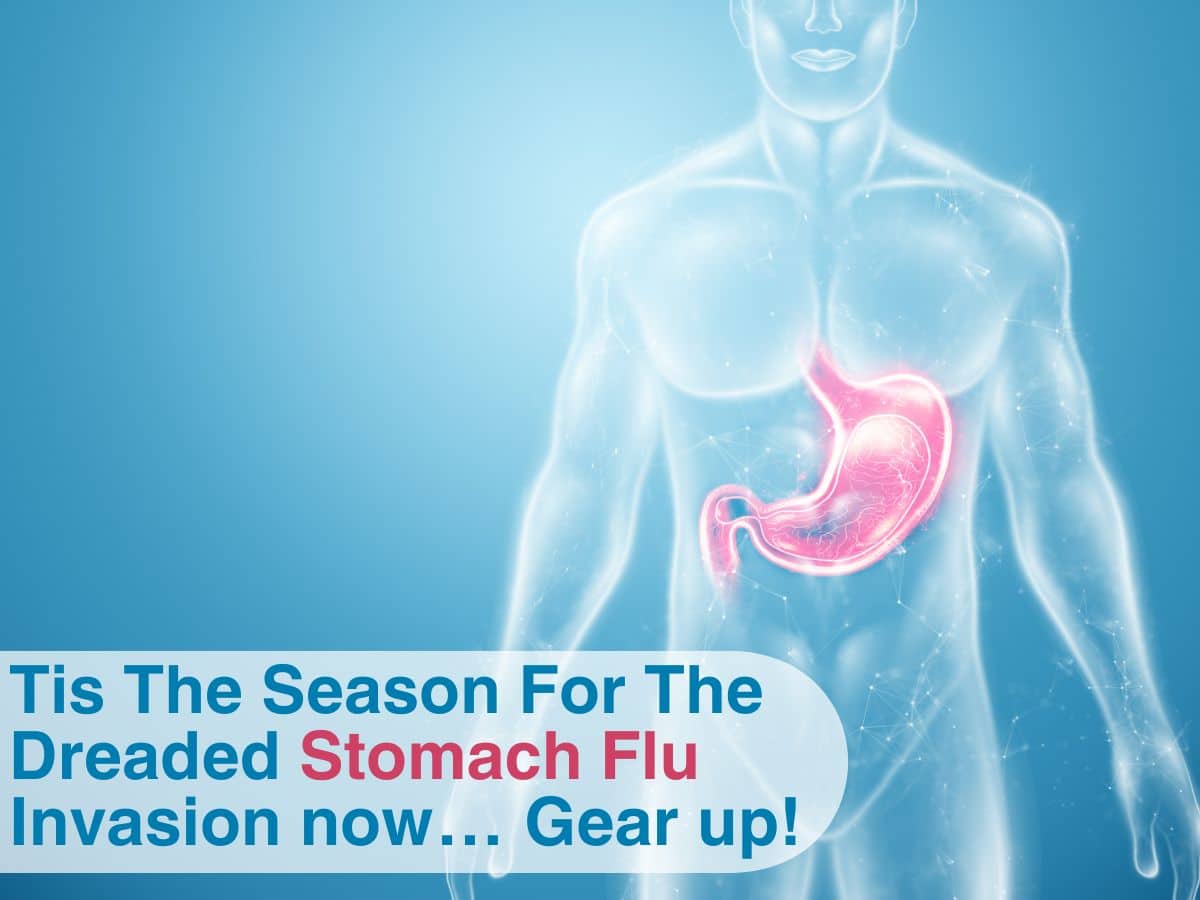
Tis The Season For The Dreaded Stomach Flu Invasion now… Gear up!

Gastroenteritis is commonly called the stomach flu, and this does (not) make sense if it is a viral infection. But, you would do well to remember that bacteria and parasites can also cause gastroenteritis. The term ‘gastroenteritis’ is used to define inflammation of the gastric lining. It can also be a side effect from using specific kinds of medication.
The viral version of this infection is commonly caused by noroviruses and rotaviruses. The bacterial causative agents can be E. coli, Salmonella, Campylobacter spp etc. Parasites like giardia or cryptosporidium can also cause inflammation.
Causes And Prevention Of Gastroenteritis
These disease causing agents are normally found in dirty water, areas with poor sanitation and hygiene practices. The best measure you can choose to take is staying at home. All of these agents are spread by physical contact. So, the droplets can stick to furniture around the house, and when you touch contaminated surfaces and then your nose, mouth or eyes, the pathogens get a direct entryway into your system. Aim to keep all surfaces clean and consume fully cooked food only. Stick to drinking only boiled or filtered water, and avoid eating any street food or raw foods that you cannot peel like fruits. Wash your hands often, with good quality hand wash or use hand sanitiser as needed.
Difference Between Food Poisoning And Gastroenteritis
Food poisoning can cause acute diarrhoea and vomiting within a few hours of exposure to contaminants, but the progression is a lot slower with respect to gastroenteritis. Both the conditions can make you feel miserable though. Just aim to hydrate and rest well, and eat bland foods to help with recovery.
How Long Does Gastroenteritis Last?
It can last from anywhere between 2-14 days. Some individuals may recover faster than others.
Symptoms Of Viral Gastroenteritis In Adults
Watch out for these symptoms-
- Stomach or abdominal cramps
- Severe diarrhoea
- Nausea
- Emesis or vomiting
- Fever
The symptoms are usually not that serious, but specific groups of the population- like children, elderly individuals, pregnant women or anyone with a compromised immune system is more susceptible to infection, when compared to the general population.
Early Signs And Symptoms Of Typhoid Fever
If the infection is not severe, then the following symptoms may be observed-
- High fever that tends to persist
- Raging headaches
- Feeling very tired all the time
- Cough
- Constipation or diarrhoea
- Random chills
- Rash on the chest or stomach
- Body ache
Gastroenteritis In Children: Symptoms And Treatment
Children are at high risk of contracting gastroenteritis, and the symptoms more or less follow the same course, but there are some crucial differences
- Loose stools for more than 1 day
- Extreme lethargy
- Emesis or projectile vomiting
- Dehydration can be severe
- Tarry or bloody stools
- High fever or any fever if in infants
- Abdominal pain
Conclusion
All of these infections are largely preventable if we follow basic tenets of cleanliness and hygiene- during food preparation and keeping all surfaces clean- like the kitchen counters, study and work areas etc. Bedding can be aired out in the sun to help relieve it of any spores or odour. Cases are pretty high in this season, and taking these basic precautions should help for the most part. Hospitalisation is usually not necessary and it can be dealt with at home most of the time. Medical professionals can be consulted for further information with respect to treatment, as for example- if it is a viral infection, then antibiotics won’t work. Take good care of yourselves this monsoon!






